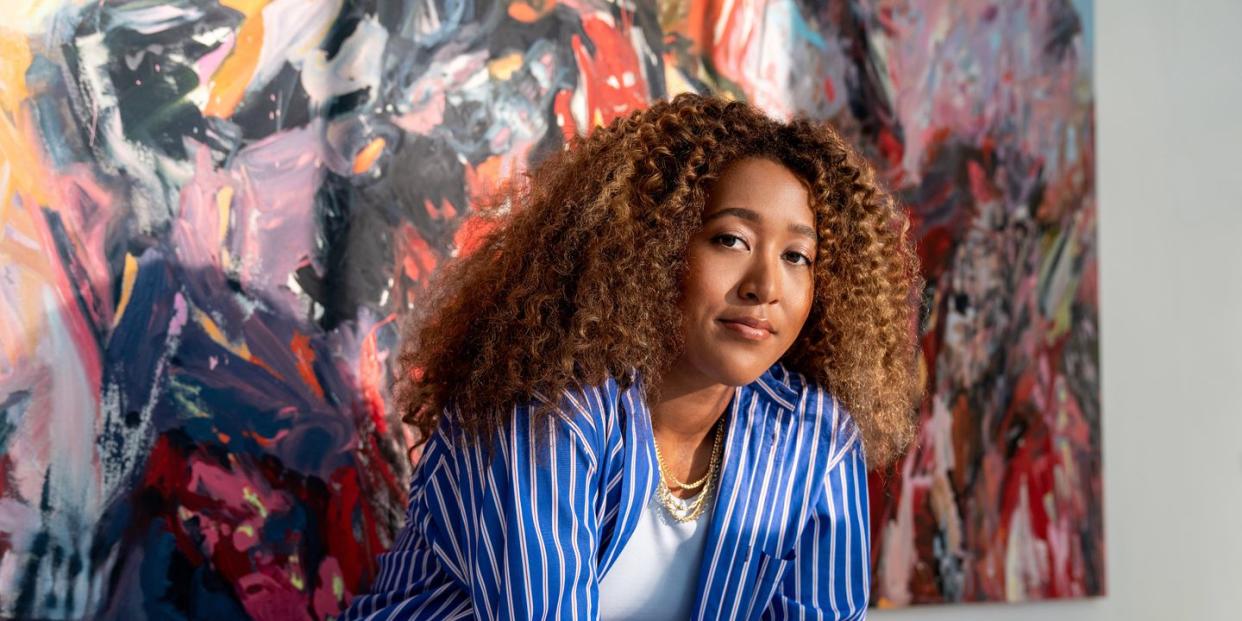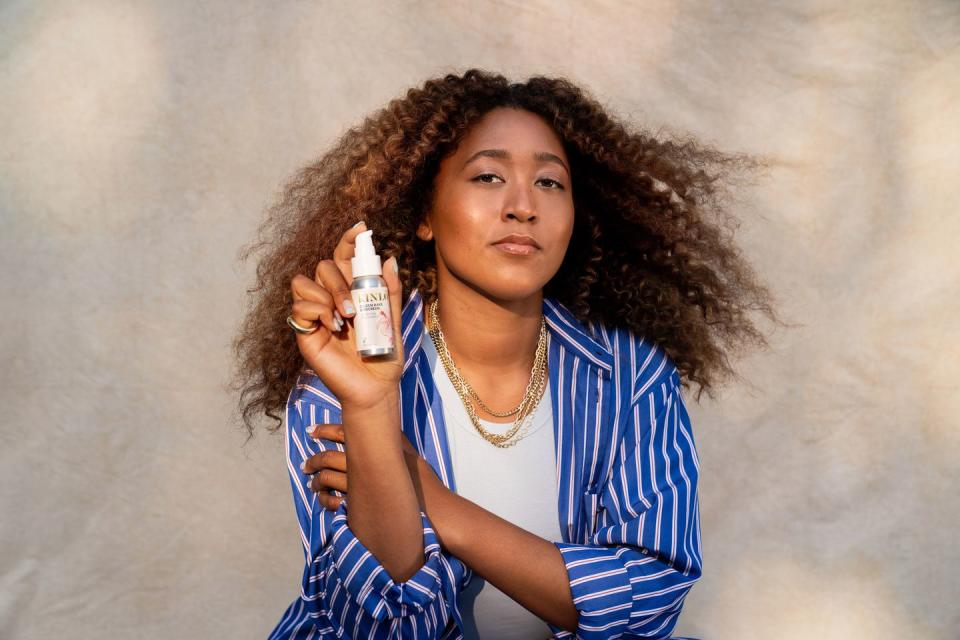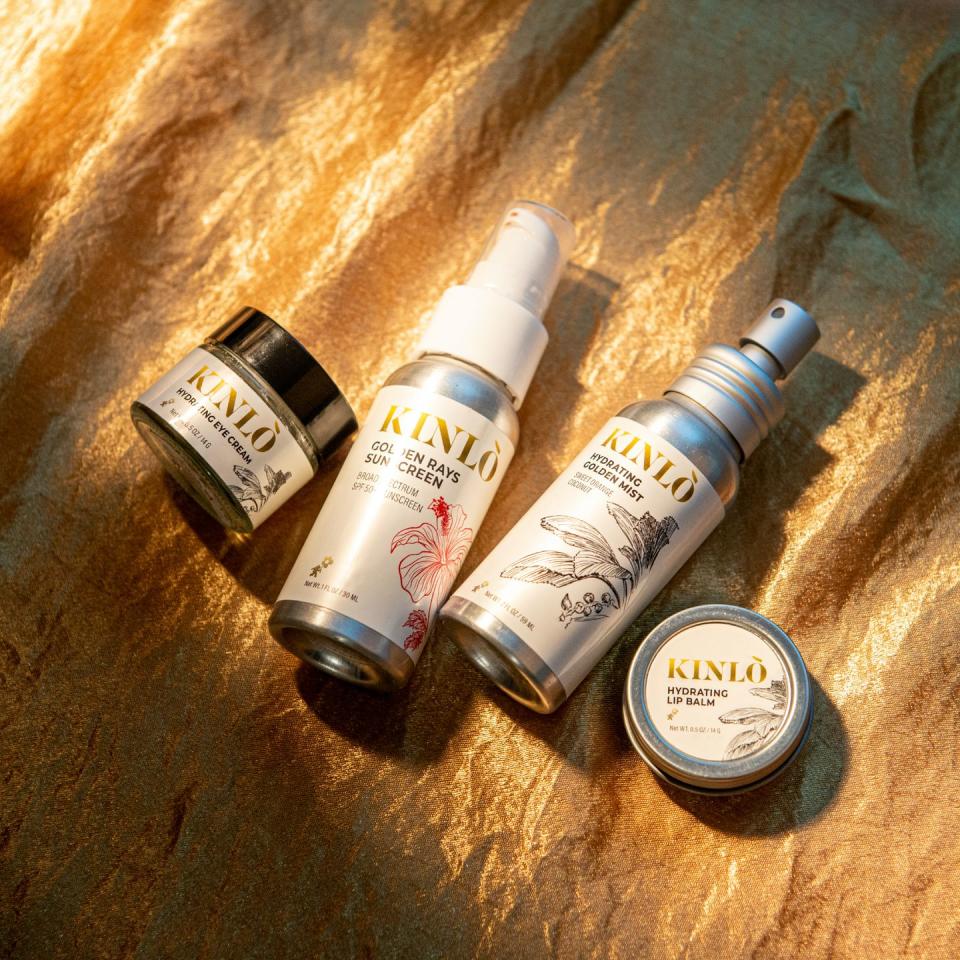Naomi Osaka Wants To "Save Some Lives" With Her New Beauty Brand

- Oops!Something went wrong.Please try again later.
"Hearst Magazines and Yahoo may earn commission or revenue on some items through the links below."
Forget the ox; 2021 is the year of Naomi Osaka. The 23-year-old four-time Grand Slam-winning tennis pro has become the face—and voice—of her generation: Outspoken and fiercely independent yet achingly vulnerable and supremely relatable, Osaka's charitable efforts and real-talk candor have placed her center stage. When she broke down during a press conference following her surprise US Open defeat last week, we choked back tears too. Because everyone knows that life can be challenging and overwhelming and exhausting—we’ve all been Naomi Osaka at one time.
And during a tumultuous, life-altering year, one could argue that no other single person has brought as much attention to the ongoing discussion around mental health than Osaka. After announcing she’d be withdrawing from the French Open last spring to focus on her struggles with anxiety and depression, she sparked a much-needed conversation around the pressures put on elite athletes, and what they should—and should not—be expected to endure to play professional sports.
But Osaka isn’t done yet. This week, the Japanese-Haitian champion is using her platform to shine a light on another issue: skin cancer awareness in communities of color. She partnered with New Jersey dermatologist Naana Boakye, M.D. and GoDaddy to launch Kinlò, a four-product skincare line devoted to darker skin tones, with products ranging from $6 to $20.
Paying homage to Osaka’s multicultural background, the name is a combination of kin and lo, which means “gold” in Japanese and Creole respectively. And the collection features something just as rare and precious: A mineral sunscreen designed specifically for melanin-rich skin that blends seamlessly with no whitish cast. We know that Black and brown men and women are also affected by skin cancer, but cosmetically elegant sunscreens for darker skin tones have been in short supply. Osaka wants to change that. “I remember as a kid hating when my parents would put sunscreen on me because it wasn’t smooth and never blended in,” Osaka tells Oprah Daily. “My hope is that this will never be that type of experience for people.”

To celebrate Kinlò’s launch, the superstar talked to us about her up-and-down year, the inspiration behind the line, and what brings her the most joy.
Brian Underwood: What inspired Kinlò?
Naomi Osaka: What I care about most is educating people, building awareness, and hopefully saving some lives. I didn't realize the importance of protecting my skin until I was an adult, so I hope the brand can help teach a younger generation better skincare habits. I'd love to eventually have a kids-specific sunscreen soon, but also want to continue to build both the protection and recovery lines of the brand. The possibilities are endless, and we'll continue to build out and focus on making products that are specifically formulated for melanated skin. I want the customer to really enjoy putting on the product and look forward to using it—not just because they know it will protect them but because they love the smell, feel and the coverage.
BU: Why did you decide to launch with the four products currently in the line?
NO: The initial product offering is all about protection and recovery. The Golden Rays Sunscreen SPF 50+ protects from harmful sun and blue light rays, while the other three products provide nourishment and hydration for after-sun and overnight recovery. I'm in the sun all day on the court, so a sweat-proof sunscreen was crucial. I also wanted to include an eye cream and lip balm since those are products I think we should all be using regularly. And the Hydrating Golden Mist is a bonus for skin hydration or even as a relaxing room spray.

BU: What was the most surprising thing you learned while developing your own skincare line?
NO: I was shocked when I learned about the statistics of skin cancer in communities of color, particularly about how much higher the mortality rate is for those of us who are diagnosed with skin cancer. That really opened my eyes to the fact that protection for melanated skin is a real public health need, and I immediately wanted to facilitate a conversation around that to help debunk the myths about us not needing to wear sunscreen because we have natural melanin. That's not true.
BU: Aside from your own line, can you tell us about some of your favorite beauty products?
NO: My mom always told me to wash my face before bed, and given my active lifestyle, it’s definitely a must even though I don’t wear a lot of makeup. I wash with Shea Moisture African Black Soap and then use a light moisturizer. I like Darphin Hydraskin.
BU: How have your Haitian and Japanese backgrounds influenced your upbringing and where you are today?
NO: I was born in Japan, so I obviously feel a deep connection to my Japanese heritage, but I've also spent a lot of time in Haiti and learning from my Dad about our Haitian roots. I always feel a lot of pride and motivation to achieve great things whenever I think about my ancestors and even my own parents and all the sacrifices they made.
BU: Some multi-racial or multi-ethnic people describe feeling pulled in different cultural directions—was that the case for you?
NO: I think people are always trying to put labels on things, and when they can't, it confuses them. I don't feel pulled in different directions because I feel equal amounts of love and appreciation for both my Japanese and my Haitian backgrounds. But I think it's tough for some people to understand that. I'm really proud of my heritage and hope I can set a good example for other kids out there who come from multicultural backgrounds.
BU: Were you surprised by the criticism you received after making the decision to withhold from press interviews and ultimately withdraw from the French Open?
NO: The whole thing definitely grew to be much larger than I ever realized it would. I was a bit surprised by how quickly it magnified. I was just trying to do what was best for myself and my own health and happiness, and I feel like I made the right decision.
BU: What would you like to say to young people struggling with anxiety and depression?
NO: I think it's so important to surround yourself with a good support system. Even if you don't feel like talking about whatever is bothering you, just knowing that you're surrounded by people who have your back is a really calming feeling.
BU: You wrote in a Time op-ed that the traditional press conference is outdated and in need of a refresh. What would you envision it changing to?
NO: I'm not sure I have the answer to that, to be honest. For me, it's just been an interesting turn of events because when I won my first Slam in 2018, I sort of became known as a good girl. I actually have a great relationship with a lot of press and reporters, and we joke around a lot and I enjoy speaking to them. But lately, as I've spoken up a bit more about things that matter to me, it feels like there are new faces in the room who are just trying to get some sort of controversial one-liner out of me to put into a headline. So, I always have to have my guard up. I also think the past year has really changed things because almost all the post-match interviews are over Zoom, so it really takes away the human interaction component which changes the conversations quite a bit.
BU: How can we help to change the conversation around mental health in our country?
NO: It's important to just talk about it. It feels like for so long there was a stigma around mental health, and no one wanted to talk about it, but now it seems more and more people are speaking up and hopefully that will help normalize it a bit and help others who might be struggling realize that they're not alone. There's a good chance that almost everyone you know is dealing with something tough, whether they've spoken about it or not. Life's hard.
BU: Many female athletes, including Megan Rapinoe, have spoken out about gender discrimination in their respective sports. Is that a problem with professional tennis, in your opinion?
NO: We're lucky in tennis in that there is relative parity when it comes to prize money. I really want to help leagues like the NWSL and the WNBA achieve the same.
BU: Fill in the blank: The thing that brings me the most joy in life is…
NO: Probably my family, my friends, and my dog Butta.
You Might Also Like

